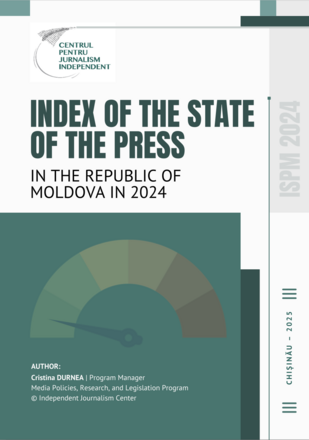
At its ninth edition, the Index of the State of the Press in the Republic of Moldova (ISPM) evaluates the overall condition of the Moldovan media sector by analyzing seven core indicators. It highlights both positive developments and persistent challenges that threaten the independence and resilience of the media ecosystem.
Political and Social Context
In 2024, Moldova’s political agenda was dominated by the EU accession action plan and a national referendum proposing a constitutional amendment to recognize European integration as a strategic goal. Against this backdrop, the electoral period was marked by unprecedented societal polarization, political tension, foreign interference, and widespread disinformation campaigns. In such context, in April 2024, the Audiovisual Council imposed its first fines for disinformation on TV-Gagauzia and ATV.
Media Legislation
Moldova’s media regulatory framework generally aligns with key international standards. Notable legislative developments in 2024 include: the adoption of the Law on the Media Subsidy Fund; the entry into force of the Law on Access to Information of Public Interest; the approval of the Law on Personal Data Protection.
The national legal framework provides safeguards for freedom of expression and media independence, including: protection of editorial autonomy, confidentiality of journalistic sources and sanctions against obstruction of journalistic activity, intimidation of journalists, and censorship of public media However, the report notes that greater transparency is needed, especially in response to rising disinformation. Significant gaps persist in aligning Moldovan law with the EU Digital Services Act (DSA) and European Media Freedom Act (EMFA). The lack of regulation in the online media sector is flagged as a key legislative shortfall.
Access to Information
Although the new law on access to public information is a step forward, its implementation remains inconsistent. Journalists continue to face delayed responses, ignored information requests and refusals unjustly justified by personal data protection concerns.
Despite these issues, freedom of expression cases are largely handled in accordance with international standards. Between 2019 and 2023, approximately 70% of such cases adjudicated by the Supreme Court of Justice were dismissed, indicating that special legal protections for press freedom are generally upheld.
Incidents and Threats
No severe cases of physical aggression against journalists were reported in 2024. However, the electoral campaign period saw a surge in public attacks and smear campaigns targeting media professionals. These were often initiated by political candidates and largely took place online.
Key incidents include:
- In December 2024, Chisinau Mayor Ion Ceban insulted several journalists during an official city administration meeting.
- In Gagauzia, the local political environment remained hostile to the press. Journalists reported multiple instances of intimidation by local authorities. Civil society also raised concerns about censorship attempts by the region’s public broadcaster.
The region of Transnistria remains outside the Moldovan government’s control and continues to pose serious risks to press freedom. The media system in Tiraspol replicates the Russian Federation’s model, leaving no space for editorial independence and maintaining a tightly controlled information environment.
Tags: Moldova Freedom of expression Media freedom Media pluralism Safety of journalists Media ownershipThe content of this article can be used according to the terms of Creative Commons: Attribution-NonCommercial 4.0 International (CC BY-NC 4.0) . To do so use the the wording "this article was originally published on the Resource Centre on Media Freedom in Europe" including a direct active link to the original article page.

